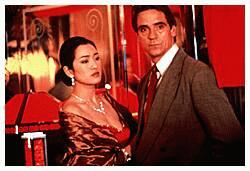
|
Starring Jeremy Irons, Gong Li, Maggie Cheung, Reuben Blades, Michael Hui. Written and
directed by Wayne Wang.
It's December 31, 1996 and New Year's Eve in Hong Kong, six months before mainland China is to take over the colony from the British. At a swanky uptown party, British journalist John (Irons) mingles among the influential guests with his photographer buddy Jim (Blades). Among the guests is a prominent Chinese businessman (Hui) and his beautiful mistress and partner Vivian (Li). John and Jim discuss among themselves that the change won't mean that much, that money will still rule Hong Kong and Chinese rule won't affect things. But news reports on Hong Kong TV report a mass exodus of British citizens going back to Great Britain, many fearing revenge by the Chinese and Hong Kong citizens for past British colonization. And just after midnight, a famous Hong Kong activist blows his brains out at this party, expressing his fear of mainland China repression on Hong Kong. John met Vivian several years earlier in Beijing, became friends and fell in love with her. But she is still waiting for her partner to propose marriage. The problem is that Vivian has a past which John accidentally discovers that makes this unlikely. John begs Vivian to leave Hong Kong with him, but she refuses. Meanwhile, John meets a scarred street vendor Jean (Cheung) hawking mostly stolen products to gullible tourists. He wants to know more about her, and pays her to tell her story, but he learns more than he bargained for. A British boyfriend she loved deeply dumped her because her daddy had signed a clause in his employment contract that his family would not get involved with any of the local Chinese inhabitants. How will John's interaction with Jean and Vivian end, and how will the July 1 takeover date affect their lives? Director Wang (Smoke, Joy Luck Club) left Hong Kong at 17, and said he always felt and tried to be British. He went back to film this as a way of examining the British and Chinese influences on Hong Kong. The problematic love affair between John and Vivian is meant to be a metaphor of the difficult love/hate relationship between the British and Chinese Hong Kong residents. One British character notes that Britain gave Hong Kong democracy in 1984, even though Hong Kong wasn't asking for it or really wanting it, but that the Hong Kong people might miss it when mainland China takes control. As a matter of fact, a mid-1998 poll found Hong Kong residents preferred British consul Patten to their new Chinese appointee by a margin of 43% to 14%. Of course that is coloured by the recent recession, but it does indicate that British rule wasn't entirely a negative thing. Like in Smoke, not a whole lot happens, and things move slowly. The movie comes to life whenever the accomplished Li is on screen, but she's not on it enough. Her face conveys the pain of Vivian's past, and the torment of being torn between two men and the Chinese conventions she is constrained by. Being drop-dead gorgeous doesn't hurt either. Cheung, one of the top actresses in Hong Kong films, is quite believable as the emotionally and physically scarred casualty of British/Chinese tensions. The problem is that her story does not mesh well with the main thrust of the movie, and it is never tied in with the rest of the film. There is very little examination about what changes are in store for Hong Kong, and how the Chinese residents feel about them. Irons is his usual cool and reserved self, and that makes the pace even slower. Blades presence adds some energy and even some humour to the film whenever he's on screen, but he's not on much. The best part of the film for me was seeing Hong Kong (I've never been there), because the story itself is not all that engrossing, although the film does have its moments.    
|